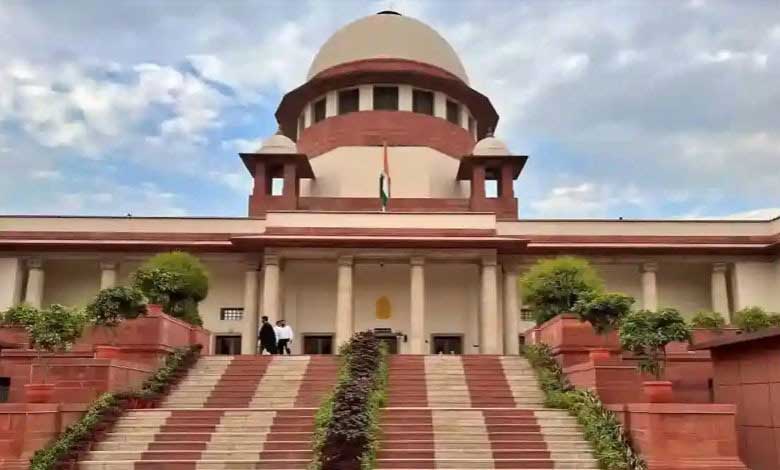Supreme Court Dismisses Plea to Recall Tamil Nadu Governor: Here Are the Details
The Supreme Court has dismissed a plea to recall the Tamil Nadu Governor, upholding the current administration. Read on for details on the decision and its implications.

New Delhi: The Supreme Court of India on Monday firmly rejected a plea seeking the immediate removal of Tamil Nadu Governor R. N. Ravi from his post, calling the petition “ill-conceived.”
The apex court emphasized that the judiciary is bound by the constitutional framework, which outlines specific provisions for the removal of a Governor.
Table of Contents
SC Upholds Constitutional Provisions on Governor’s Removal
A bench comprising Chief Justice of India (CJI) Sanjiv Khanna and Justice Sanjay Kumar dismissed the plea filed by advocate C.R. Jaya Sukin, stating, “We cannot grant such prayers. There are constitutional provisions for this (removal of Governor). This court is also bound by the Constitution. The petition is dismissed.”
The Constitution of India stipulates that a Governor serves “at the pleasure of the President” and can hold office for up to five years unless removed by the central government. The petition argued that several Supreme Court rulings had established that a Governor must operate strictly within the constitutional framework and refrain from engaging in political activities.
Governor’s Controversial Exit from Tamil Nadu Assembly
The plea follows a recent controversy involving Governor Ravi, who walked out of the Tamil Nadu Assembly on January 6, 2024. The dispute arose when the National Anthem was not played at the start of the session, prompting the Governor to exit in protest.

According to a statement from the Raj Bhavan, “The Governor respectfully reminded the House of its constitutional duty and fervently appealed to the Chief Minister, who is the Leader of the House, and the Speaker to sing the National Anthem. However, the Assembly ‘stubbornly refused’.”
The Raj Bhavan further justified the Governor’s decision, stating that he did not wish to be complicit in “such brazen disrespect to the Constitution and the National Anthem.” Instead, the Assembly had opted to sing the Tamil state song, Thamizh Thai Vazhthu.
Tamil Nadu CM Stalin Criticizes Governor’s Actions
Chief Minister M.K. Stalin reacted sharply to the Governor’s actions, accusing him of political motivations and an inability to accept Tamil Nadu’s progress. He claimed that Governor Ravi’s refusal to deliver his official address in the Assembly and his protest against the order of events were disrespectful to the dignity of the House.
“By disrespecting the dignity of the House, the sentiments of the people, and daring to insult the Tamil Thai Vazhthu, the Governor has demeaned his official position with political intent. The House has never witnessed such acts, and it must not witness them again,” CM Stalin said.
This incident is not the first time the Tamil Nadu government and the Governor have clashed. In the 2024 Assembly session, Governor Ravi refused to deliver the customary inaugural speech prepared by the Tamil Nadu government.
He read only the opening paragraph before walking out, reducing what was supposed to be an hour-long speech to just three minutes. His primary objection was to certain portions of the address, which he claimed did not align with the constitutional framework.
A History of Clashes Between TN Government and Governor Ravi
Governor Ravi’s tenure has been marked by multiple controversies, with several disputes between him and the ruling Dravida Munnetra Kazhagam (DMK) government.
In the 2023 Assembly session, Ravi faced criticism for omitting references to secularism, the Dravidian model, and key figures such as Periyar, B.R. Ambedkar, and former Chief Ministers C.N. Annadurai and M. Karunanidhi in his speech. These omissions sparked outrage among Tamil Nadu’s political leaders and the public.
The ongoing friction between the Governor and the Tamil Nadu government has fueled demands for his removal. However, as the Supreme Court has reaffirmed, the only constitutional route for removing a Governor lies with the President of India.
Legal and Political Implications
The Supreme Court’s dismissal of the petition reinforces the constitutional principle that the judiciary cannot interfere in the discretionary powers of the President regarding the appointment or removal of Governors. Political analysts believe that this ruling sets a precedent for future disputes involving Governors and state governments.
Legal experts have pointed out that while Governors are expected to act in accordance with the Constitution, the mechanism for their removal remains firmly under the purview of the Union Government.
As tensions persist between the Tamil Nadu government and Governor Ravi, it remains to be seen how this political battle will unfold in the coming months. For now, the Supreme Court’s ruling underscores the importance of adhering to constitutional processes rather than seeking judicial intervention in matters concerning gubernatorial appointments.
